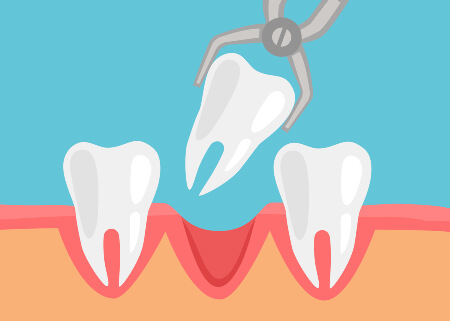
Dental Extractions
in Shenton Park
Retained Baby Teeth
Occasionally a baby tooth may not fall out when it’s supposed to. When it’s retained for too long, the baby tooth can alter the eruption of the adult tooth underneath as well as the alignment of neighbouring teeth. If the primary tooth doesn’t fall out within a specific window of time (based on your child’s oral development) it may be necessary to help things along by removing it altogether.
Orthodontic Extractions
Are you about to begin orthodontic treatment? If your mouth is relatively small or teeth are too crowded to space appropriately, specific teeth in the mouth can be extracted to create additional spacing. Orthodontic extractions are typically conducted on a case-by-case basis, depending on the recommendations of your provider.
Dental Emergencies
Intense pain, infection or severely fractured teeth may need to be removed to provide pain relief. Especially if the damage is severe enough to prevent any type of restorative process. For instance, if your tooth is broken off at the gum, there will not be enough of a base to support a crown. The better option is to remove the remaining root to prevent recurring infection and pain.
Other Considerations
- Periodontal Disease: Aggressive gum disease destroys the gum and bone tissues that support your teeth. If your tooth is mobile or hurts to chew on, there may be little to no structural reinforcement around the root. Removing the tooth can aid in eliminating the infection and prevent it from spreading elsewhere in your mouth. Fortunately, most cases of gum disease are treatable, so extractions are typically reserved for more aggressive stages of infection.
- Wisdom Tooth Removal: Perhaps the most common dental extraction is wisdom tooth removal. If you have a wisdom tooth that is not fitting into the mouth properly, is impacted or coming in at an angle, it can easily damage your adjacent teeth. Their location alone makes wisdom teeth highly susceptible to decay and gum disease. When they create pressure it can lead to overall bite issues and tooth misalignments throughout your smile. More often than not, proactive wisdom tooth extraction is the best route of care. Especially if you plan to have or recently completed orthodontic treatment.
- Post-Surgical Recovery: For basic dental extractions, we recommend taking the rest of the day off to relax at home. As long as you’re recovering well, you may be able to head back to work the next day. Especially if we’ve prescribed an antibiotic or pain medication. More complex oral surgeries such as wisdom tooth removal may require a few extra days off work. We can arrange a medical certificate for the appropriate amount of time when necessary.
- Keeping You Comfortable: If you’re anxious about having a tooth removed, we will do everything possible to ensure your comfort. We can coordinate options like oral sedation or have an anaesthetist come in for an IV sedation (twilight sedation) procedure here in our office. In more extreme scenarios, we can arrange for you to complete your surgery at a hospital with a licensed oral surgeon.
Reserve a Consultation
Should you have your tooth extracted or is it better to try and save it? Contact Shenton Park Family Dental to request an exam.
Any invasive or surgical procedure may carry risks. Before moving forward, it is recommended that you seek a second opinion from an appropriately licensed medical professional.

